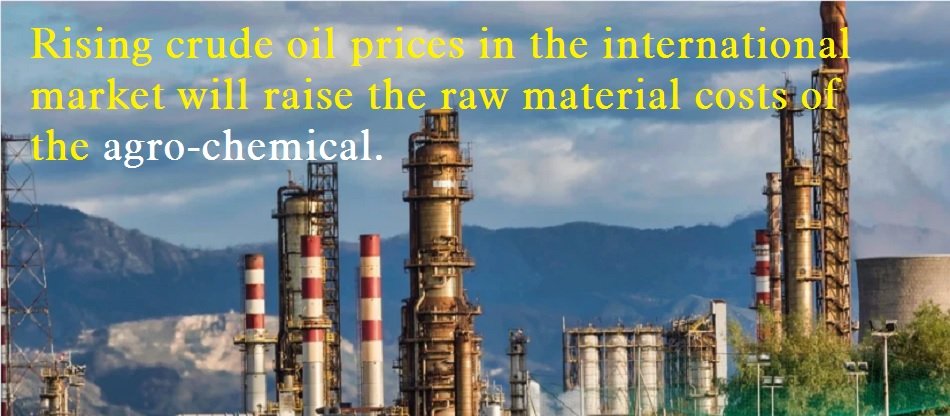A top Tata Chemicals executive has stated that rising crude oil prices in the international market will raise the raw material costs of the agro-chemical sector because the majority of them are petrochemical byproducts.
‘Farmers will be obliged to spend more, which will have a negative influence on their earnings. The increase in energy prices will have an inflationary effect on the whole,’ added Zarir Langrana, Executive Director and President (Global Chemicals Business), Tata Chemicals Limited.
Ministry of Chemicals and Fertilizers called industry for emergency meeting
In August of this year, India purchased 17.4 million tonnes of crude oil worth $9.1 billion, ‘amounting to 86% of our annual requirement,’ he claimed. ‘This in and of itself demonstrates how the rise in crude oil prices will raise the nation’s overall expenditure, so negatively influencing the fiscal imbalance.’
His opinions are crucial given that Brent crude oil is now trading at around $80 per barrel and WTI crude oil is trading at roughly $77. Brent crude has increased by 52% this year, while total crude oil has increased by 58%.
Crude oil inventories are 7% lower than the five-year average. Despite concerns about an economic downturn caused by the emergence of the Omicron type of coronavirus, interest rates remain stable.
Soda ash demand is on the rise
Tata Chemicals, one of the top five global producers of soda ash, predicts that the chemical’s price would rise again next year. Langrana stated that the global economic rebound this year, following the Covid-19 pandemic epidemic, has continued to increase demand across regions and industries.
‘On the back of this strong demand-pull, soda ash plants throughout the world have been operating at capacity; and with no major new capacity coming on the market in the short- to medium-term, the market has remained snug to short — a trend we expect will continue until 2022,’ he said.
One of the commodities whose market prices have doubled year to date is soda ash, which is used in solar glass, lithium refining for lithium-ion batteries, power utilities, and vehicles.
‘Demand growth has been especially robust in the new sustainability-focused dawn applications… while more established applications in container glass, chemical processing, and detergents have returned to normal levels,’ said Tata Chemicals’ worldwide business president.
Standing Committee dismissed pesticides company’s demand on three key issues
Advancement
When asked about the company’s intentions for boosting soda ash capacity, Langrana stated that expansions for soda ash and other products were underway at the company’s Mithapur plant in Gujarat. A substantial increase in local demand, chances for import substitution, and the possibility for exports, he says, allow further opportunity for growth.
Concerning sodium bicarbonate, also known as baking soda, which the company manufactures in the United Kingdom and India, plans for ‘expanding the product’ remained in place, ‘with the potential for even more ambitious goals.’
‘Due to our focus on market development, our animal feed-grade ‘Alkakarb’ and food-grade ‘Sodakarb’ registered double-digit volume increase.’ Our newest product, the specialty pharma-grade ‘Medikarb,’ India’s first branded pharma-grade sodium bicarbonate, has also shown encouraging double-digit growth and offers great promise, he added.
Tata Chemicals sees a comparable chance to boost output at its UK facility. ‘the first crucial step has been the installation of our carbon capture and utilization plant, which enables us self-sufficient for a major raw resource,’ Langrana explained.
Bicarbonate formation
Sodium bicarbonate, a critical downstream product from soda ash, has shown consistent demand during the epidemic, which is projected to continue, he said.
Every few years, new applications for the product emerge, ranging from animal feed to emission control to the food and pharmaceutical industries.
‘The fastest growth is seen in haemodialysis. With demographic changes and an ageing population in many parts of the world, this sector is quickly developing.’ Langrana said, adding that India’s low per capita consumption of bicarbonate also allowed ample space for expansion.
‘Detrimental’ farm laws are being repealed
In response to the recent repeal of farm laws, he stated that it was detrimental not only to businesses but also to farmers. He said that the measures would have benefited the farm sector in the long run.
‘India’s processed foods business, worth more than 2.6 lakh crore, was looking forward to sourcing produce directly from farmers and significantly lowering input costs,’ he said.
Traditional agrochemical companies banking on natural, biochemical solutions sector
However, the Centre’s other activities, such as fostering the establishment of farmer producer organizations, cooperatives, and other technology interventions, which are mostly driven by the start-up ecosystem, are critical. They will help to organize the agriculture industry and accelerate the use of innovative technology for farm productivity and income, he said.
The company will continue to grow in 2022 based on the pillars of sustainability, digitization, and innovation. ‘Our pledges to serve the communities we influence in and around our regions of operation with development models that are sustainable, reproducible, and scalable would not be diluted,’ Langrana added.


















Add Comment